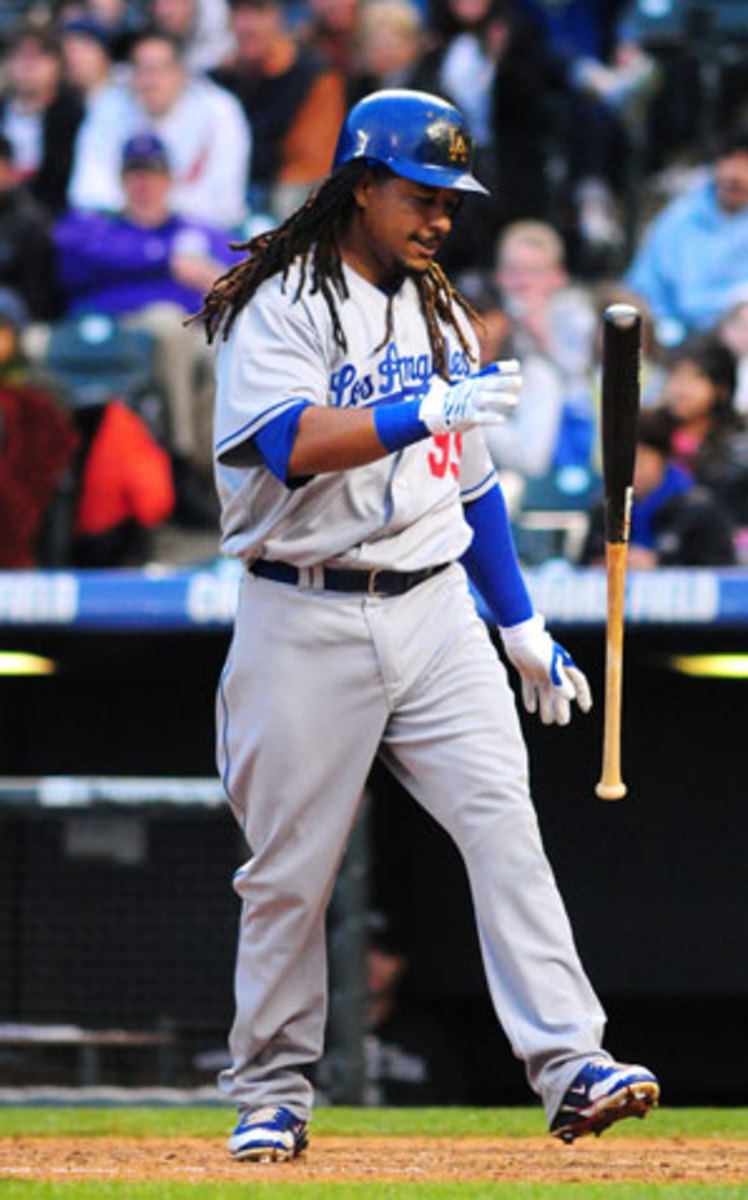
A-Rod, Manny Ramirez great with steroids, but what about now?
Alex Rodriguez is a baseball player.
Alex Rodriguez used performance-enhancing drugs.
Alex Rodriguez presumably no longer uses performance-enhancing drugs.
As of Friday morning, Alex Rodriguez is batting .223.
Hmm ...
I know. I know. Shut up. Typical media idiot. Go back to college. Enough with the steroid talk. I've got it.
And yet in the days and weeks since Rodriguez's highly anticipated return to the Yankees' lineup, the media has racked their brains trying to figure out why the All-Star third baseman has morphed into a reenactment of Wayne Krenchicki: The Baltimore Years.
Larry Brooks, New York Post: "Maybe, just maybe, the combination of missing spring training's swings that Rodriguez religiously craves plus the daily demands of playing baseball just two months removed from hip surgery have left a residue that's created a massive slump."
Michael Salfino, SportsNet New York: "If the lack of protection was viewed as an excuse for [Mark] Teixeira, why isn't Rodriguez given amends for the same thing? Who's protecting him?"
Steve Phillips, ESPN: "I think he probably rushed back, but by now, he should have been able to brush off the rust and be back. Because he hasn't, it leads me to believe that he has some mental issues that he's dealing with, in that he's trying too hard to get back at the plate. That causes him some mechanical issues at the plate, causing him to open up to early."
Now, let's add a fourth:
Jeff Pearlman, SI.com: "He's not that good."
Again, I know. I know. Blasphemy! But the question must be addressed: Why is it that, when PED-implicated ballplayers return from lengthy absences, we never ask whether their non-drugged selves will live up to past greatness? If, as was suggested by Selena Roberts in her recent biography, A-Rod: The Many Lives of Alex Rodriguez, Rodriguez used performance-enhancing drugs during his Yankee tenure, shouldn't his presumed newfound, post-steroid cleanliness coincide with a dropoff? After all, performance enhancers enhance performance. They make you stronger, faster, quicker. They help you work out more, bounce back in a shorter time span.
In Los Angeles, the Dodgers anxiously await the July 3 return of Manny Ramirez, who was suspended 50 games for failing a drug test. After initially protesting his guilt, Ramirez slunk off into the abyss -- a guilty man hoping that, with time, all things pass. Now, all things have passed. Yet instead of wondering whether Manny will return as Jim Rice or Jim Bolger, the Dodgers assume they will be getting the same masher who averaged 36 homers and 118 RBIs over his first 14 full seasons. Manager Joe Torre, whose continued naiveté/indifference over steroids staggers the mind, has repeatedly expressed his excitement over Ramirez's reappearance in the Dodgers outfield, where he clearly expects nothing less than an All-Star-quality slugger.
But why? At 37, Ramirez has reached the chronological threshold, where the majority of legends find themselves either mimicking Buddy Biancalana or filming "Hi! I'm Danny Tartabull! You might remember me from ..." commercials for Biff Jones Toyota. At 37, Dale Murphy was batting .143 with no home runs in 26 games with the Rockies. Duke Snider was batting .210 with four homers and 17 RBIs for the San Francisco Giants. Mickey Mantle, Joe DiMaggio and Roger Maris were retired.
"Nobody wants to touch this issue, because it's Kryptonite," said Howard Bryant, author of Juicing the Game, the brilliant steroid-era book. "But how do we know players like Manny Ramirez aren't steroid-fueled creations? We don't know anything about why he used or how long he used. But we do know he used. So if he's actually not using, what's really there?"
When someone like Jason Giambi apologizes for his drug usage, then never recaptures his past greatness, we seek out excuses. He's older. He's not comfortable in New York. He's soft. "If you follow [the] entire narrative of the steroid era, it's always been written through the eyes of the players and for the benefit of players," Bryant said.
Bryant is 100 percent right. But now, with two all-time greats finding themselves in the most awkward of positions, we must wonder beyond when they'll regain their greatness.
We must wonder whether there's any true greatness to regain at all.




